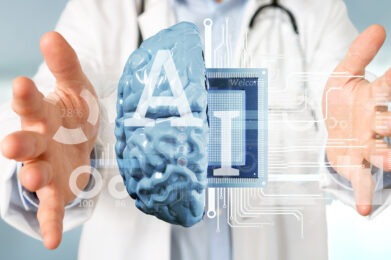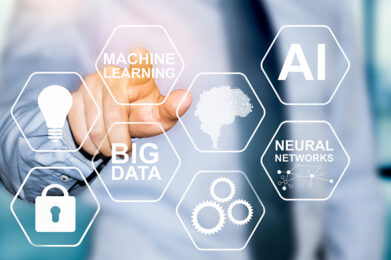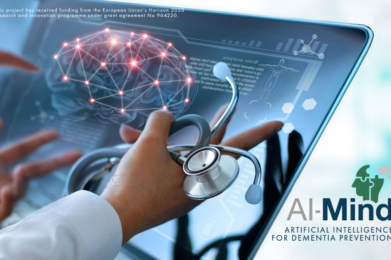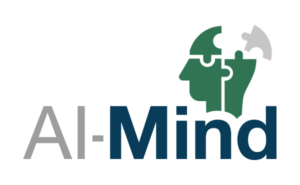Abbreviations
EEG
Electroencephalogram
MEG
Magnetoencephalography
AI
Artificial Intelligence
HTA
Health Technology Assessment
MCI
Mild Cognitive Impairment
ML
Machine Learning
DL
Deep Learning
GDPR
General Data Protection Regulation
AI technology and engineering
Below, you find resources on the engineering principles behind AI-Mind tools, covering AI algorithms, machine learning, deep learning, and platform architecture. Designed to help understand the technical aspects and limitations of AI in medical diagnostics, these materials are intended for clinicians, researchers, engineers, IT directors, healthcare professionals, and patient organisations.

AI technology
Resources offering insights into the capabilities and opportunities of AI technology in healthcare, including advancements in data analysis and predictive diagnostics. Resources also cover the potential for AI-driven innovation while addressing the technical challenges.
Stay up to date – visit soon to access any new publications on this topic.
Stay up to date – visit soon to access any new reports on this topic.
Presentation: What are the opportunities created by Artificial Intelligence in dementia research and diagnosis? Watch recording.
Presentation: The potential of synthetic EEG data in the diagnosis of neurological diseases using AI systems. Watch recording.

Machine & deep learning
Resources providing information on the application of ML and DL for analyzing large-scale healthcare data, with a focus on EEG-derived brain metrics. Guidance on using ML and DL to extract patterns from EEG data and refine predictive models to enhance brain health diagnostics.
Advancing EEG prediction with deep learning and uncertainty estimation. Read here: DOI
DREAMS: A python framework to train deep learning models with model card reporting for medical and health applications. Click here to access the pre-print.
Stay up to date – visit soon to access any new reports on this topic.
Poster: Exploring Novel RT-Based Measures Calculated from Detailed Paired Associate Learning Task Data: Preliminary Analyses. (CTAD 2024) Access the poster here.
Info cards: dementia, MCI, risk factors. Available here.

AI-Mind tools
Resources dedicated to the development of the AI-Mind Connector, which uses EEG images to identify early disturbances in brain networks, and the AI-Mind Predictor, which integrates data from the Connector, cognitive tests, and blood analysis to provide accurate dementia risk predictions.
Stay up to date – visit soon to access any new reports on this topic.
D4.2, May 2022: AI-Mind UI/UX Design and Guidelines: This deliverable describes the research and development of key user-focused elements for the AI-Mind Platform, including user personas, usage scenarios, and journey maps. It also presents early and advanced prototypes of the AI-Mind Connector and Predictor applications, along with guidelines for their use. These elements follow a Human-Centered Design (HCD) approach to create a platform that is easy to use and trusted by its users. The report explains the methods used, the development process, and the main results.
D6.2, August 2022: Decision analytical model for early assessment: This deliverable provides an early assessment of the potential health outcomes and cost-effectiveness of the AI-Mind Connector and Predictor. The analysis involves constructing a decision analytical model to compare current clinical practices with a scenario in which the AI-Mind tools are implemented, helping to evaluate their impact at an early stage of development. This decision model is delivered as an interactive dashboard. Access the dashboard here.
D5.3, August 2023: Midterm report on the AI-Mind Connector specifications: This deliverable assesses the specificity and sensitivity of the AI-Mind Connector in detecting network dysfunction in individuals with MCI at risk of dementia. It aims to identify key clinical outcomes and evaluate the AI-Mind Connector as a potential biomarker. The report outlines the planned data features and AI approaches while setting the foundation for comparison with state-of-the-art diagnostic methods at the project’s conclusion.
D5.4, August 2023: Midterm report on the AI-Mind Predictor versus SOA including a report on the use of digitalised cognitive tests: This deliverable outlines the conceptual development framework of the AI-Mind Predictor and its expected accessibility in clinical practice compared to state-of-the-art diagnostic procedures for evaluating the clinical trajectory of individuals with MCI. It also examines the scientific basis for using digitalized cognitive tests, specifically the Cambridge Neuropsychological Test Automated Battery (CANTAB). Additionally, the report explores the level of trust in CANTAB across different countries, based on insights gathered through a survey conducted among clinical sites.
Presentation: No-Age & NO-AD Seminar Series-AI-Mind: Intelligent digital tools for screening of brain connectivity. Watch recording.

